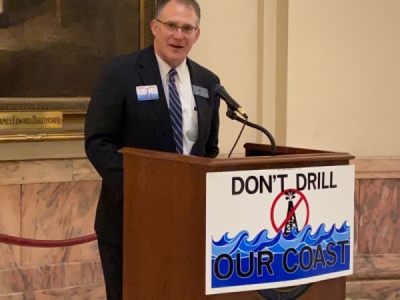
Posted on March 2, 2020
Nonbinding resolutions, by definition, have no direct effect, but a state House resolution passed in 2019 against energy exploration off the Georgia coast led U.S. Rep. Buddy Carter, R-1, to reconsider his position and send a letter to the Interior Department asking it to remove the state from its offshore oil and gas leasing plans.
Coastal members of the state Senate hope to capitalize on the success of the House and pass a resolution proclaiming the Senate’s opposition to energy exploration, including seismic airgun testing, in waters off the Georgia coast.
Backed by organizations like the Georgia Conservancy, Georgia Conservation Voters, Georgia Interfaith Power and Light, Oceana Georgia, One Hundred Miles and the Surfrider Foundation, the senators for the 1st, 2nd and 3rd districts held a news conference earlier this week at the Capitol in Atlanta to draw attention to their effort.
State Sen. William Ligon, R-White Oak, opening his remarks with lines from Sidney Lanier’s poem, “The Marshes of Glynn,” said people’s experiences with the marsh and sea, as well as the wildlife they quarter, are part of who Georgians are.
“They form a shared heritage that connects us with past generations,” Ligon said. “We instinctively know that the elements of our coast are delicate, precious and worthy of our protection. Almost two generations ago, the people of Georgia fulfilled their duty to preserve this resource by supporting the passage of the (Coastal) Marshlands Protection Act.
“It is now time for the Georgians of this generation to act. The beauty of our coast should not be put at risk by derricks drilling for oil. By passing this resolution, we are doing what we can do to connect with future generations, and ensure that they will not only read about the wonders of our marsh, rivers and sea through poetry and other works but actually experience those things that Lanier wrote about so long ago.”
State Sen. Ben Watson, R-Savannah, said the three coastal senators are united on what is a nonpartisan issue. It’s about taking care of the state’s marshes and its coastal region, he said.
While S.R. 88 is nonbinding, it’s a sound acknowledgement that they value the coast, Watson said.
State Sen. Lester Jackson, D-Savannah, pointed out the dozens of communities that passed resolutions in recent years against offshore energy exploration.
That list includes Brunswick, Kingsland, St. Marys, Savannah, Tybee Island and others.
He also discussed the perceived dangers of seismic testing and ita effect on the North Atlantic right whales and other sea creatures.
Atlanta Democratic state Sen. Nan Orrock spoke as a representative of inland communities.
“All up and down the East Coast, and you all know this, there’s opposition to drilling off the coast of the Atlantic Seaboard states,” Orrock said. “We want Georgia to be a part of that effort, lifting our voices. We saw the Florida governor step up and get Florida completely taken out of the formula, just as soon as they announced East Coast offshore drilling.”
Orrock was referring to talks between then-Gov. Rick Scott and then-Interior Secretary Ryan Zinke at a Florida airport in 2018. Assurances that there would be no drilling off Florida’s coasts were informal rather than official, though it’s since been treated like an official act.
U.S. Sen. Marco Rubio, R-Fla., said in releasing his hold Tuesday on a Trump administration Interior nominee that he expects the department to continue respecting the moratorium on drilling in the eastern Gulf of Mexico.
The Trump administration’s entire offshore leasing plans are up in the air, however, following a ruling in a federal district court in Alaska. Lawsuits continue in other areas of the country, as well. An action in federal district court in South Carolina seeks to bar the government from issuing permits that would allow for seismic airgun testing off the Atlantic Coast, a prerequisite for drilling.
The state Senate resolution was introduced inf 2019 but has yet to receive a hearing in the Senate Natural Resources and Environment Committee.
“(S.R. 88) is being held because there are forces who make money in the fossil fuel industry and who want to preserve their right to exploit natural resources in a way that harms and degrades our environment and our people,” Orrock said.
Source: thebrunswicknews.com





